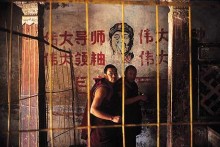I grew up in northeast China until the age of 13. Since I was little, I have been bombarded with the message that China is a nation consisted of 56 ethnicities. On TV, I would be presented with an exotic dance by one of the minority groups, or a patriotic song that celebrates the diverse- but harmonious-Chinese nation. Gradually, this thought became so ingrained in my mind that I stopped thinking about it. I was very proud though; as an ethnic Han, I told myself to be loyal to this great nation and loving towards the minority groups. Then, I moved to Canada.
Here, I discovered many fascinating subjects. One of them being Tibet, a plateau region located in western China northeast of the Himalayas. It refers to not only the Tibetan Autonomous Region, which is one province-level autonomous region inside China, but also other culturally Tibetan areas within provinces of Qinghai, Gansu, Sichuan and Yunnan. The Tibetan people is one of the minority groups in China, who are famous for their Buddhist religion, the Potala Palace and the snowy mountains.
My interest in this region began when I became acquainted with some second-generation Tibetans born in exile. Their grandparents or parents left Tibet with the 14th Dalai Lama after the 1959 Tibetan Uprising. Born and raised in India or Nepal, they later immigrated to Canada as political refugees. At the beginning, I was merely interested in getting to know them because I had never personally interacted with Chinese ethnic minorities. In China, a mysterious and alluring facade on the other 55 “sisters and brothers” of mine has been successfully created; I was curious. Later, after the many conversations I have had with Tibetans, my curiosity was somewhat satisfied. However, it was no longer my purpose. I stopped being mesmerized by the unfamiliar, be it their language, their clothes, or their religion. I began to remember, to think, and, to question.
How and why do I belong to the same country with people whom I share no similarity with? How did the 6 million Tibetans end up being governed by people whom they feel no connection with and therefore do they want it? Has the so-called “Chinese nation” existed for a time historically and culturally, or, is it merely a recent political and social construct to “brainwash” the young generation just like myself? Since then, I have incorporated the subject of “Tibet” into my daily routine. I read about its history, culture, religion and of course, politics. I do not hope to form a solid stance any time soon on controversial issues such as “Tibetan independence” and the legitimacy of China’s sovereignty over Tibet. Nevertheless, I have greatly enjoyed this journey of exploration, analysis and, most importantly, de-learning the knowledge I had acquired while I was not able to think independently and critically.
Through this experience, I have also realized that inside China, many important questions are not even being raised. Often times, only one side of the story is displayed, repeated, and then instilled into the minds of its citizens. Those Chinese citizens include people like me who belong to the majority ethnic group, who have benefited from China’s economic prosperity, and who have innocently embraced the “Chinese nation” narrative constructed by the Chinese government. What is often unknown is that they also include the Tibetans. They are denied Chinese passports to leave the country albeit being called Chinese citizens by the government. They are constantly being visited by their Han brothers and sisters who may view them as exotic and backward, but never ask them for what they want. They are struggling to preserve their unique culture and identity in a country dominated by another ethnic group who has acquired a rather strange mix of traditional Han and capitalistic Western culture.
My favorite Chinese writer, Wang Lixiong, has written that people often think the issue of Tibet centres on whether it should or will become independent. They fail to realize that it is way more complicated and far-reaching. To him, the “Tibet issue” covers nearly all conflicts and contradictions pertaining to the human race: the craving for sovereignty and dominance, nationalism, the clash between modernization and religion, the difference between the West and the East, the loss of traditional culture and the breakdown of certain value systems, economic development and environment preservation, regional politics, and, national interests and international big-power politics. I could not agree more.
-written by Lily Li, a second year student majoring in criminology and double minoring in contemporary Asian studies and psychology, and Katy Wang, a fourth year student in English and psychology at the University of Toronto
